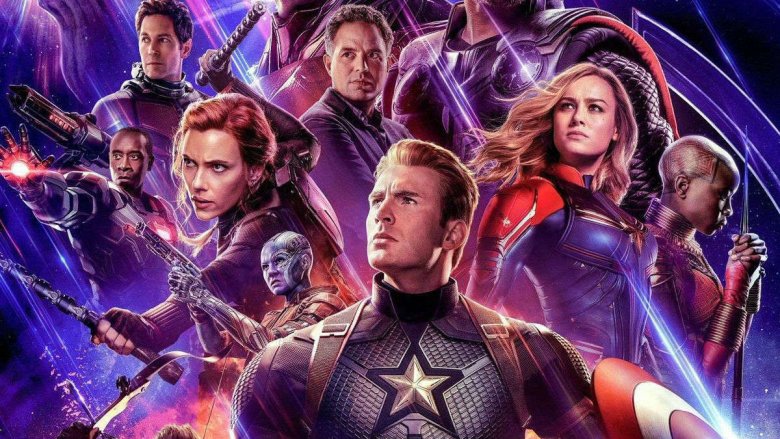Endgame Writers Explain Why This Character Had To Die
The Avengers: Endgame creative team may have broken our hearts, but they didn't do it arbitrarily.
In a recent conversation with the Los Angeles Times, screenwriters Christopher Markus and Stephen McFeely explained their reasoning behind the death of a major character in the box-office smash, and we have to say, it's pretty solid. In case that previous sentence wasn't warning enough, be advised that we'll be getting into major spoilers for Endgame here.
The death in question: that of Tony Stark, who fearlessly used his Infinity Gauntlet 2.0 to make the ultimate sacrifice play, snapping Thanos and his entire invading army out of existence. The strain of using the power of all six Infinity Stones combined was too much for his mortal body to bear, and after being assured of the Avengers' victory by young protégé Peter Parker and hearing soothing words from wife (and mother of young daughter Morgan) Pepper Potts that it was okay for him to let go, Iron Man shuffled off the mortal coil and forever cemented his position as the Marvel Cinematic Universe's greatest hero.
First, let's get this out of the way: it's been widely speculated that Downey's contract would expire with Endgame, and just a couple of months ago, an inside source reported to We Got This Covered that the flick would indeed represent the star's final MCU appearance. Of course, that didn't necessarily mean that Stark would have to die; Chris Evans is also highly unlikely to return to the franchise, and his Captain America got a sendoff that was just as emotional, but not nearly as lethal. However, according to Markus and McFeely, they felt that the plot point was necessary in order to give Stark an emotionally satisfying end to his decade-plus-long character arc.
"We always knew we wanted him to bring it on himself as opposed to being killed by Thanos," Markus said. "Because it's really the one thing left for him to do, in a way. The five-year jump allowed him to become this fully realized human: He married Pepper, he had a child, he basically retired from public life and lived a very peaceful existence out there in the country."
The scribe went on to explain that by allowing Stark to go out on his own terms and literally save the entire universe in the process, Endgame was able to put an exclamation point on his evolution from the cocky, arrogant "genius, billionaire, playboy philanthropist," we saw in the MCU's Phase 1 — plus, it just made narrative sense. "We knew he was going to die, but we wanted to put it in his hands as opposed to someone else's," Markus explained. "We didn't always know that the Infinity Stones were going to be what caused it, but once we worked out the mechanics of it with the nano particle [tech] that both the gauntlet and his suit were made out of, it all worked too perfectly not to do."
It's also fitting that — given the fear of ultimate failure which had driven his actions ever since 2015's Avengers: Age of Ultron — Stark was given the opportunity to overcome that fear in the most dramatic possible fashion, realizing his destiny as the key to the one strategy in 14,000,605 possible variations that would result in Thanos' defeat and the restoration of half of all life in the universe. It also opens up the possibility of a new breed of heroes arising, heroes that are motivated and inspired by Iron Man's sacrifice — and of course, the first to struggle with living up to his example is bound to be Peter Parker.
In the new, spoiler-filled trailer for Spider-Man: Far From Home, it's revealed that Parker has had a rough time letting go of his mentor, and there is even an explicit reference in the spot for the need for a "new Iron Man" to step up to protect the world. It's implied that Spidey may, at least initially, be looking to Jake Gyllenhaal's Quentin Beck — AKA Mysterio — to fill that role, and perhaps even act as a new mentor to him in Stark's absence. But, despite all that the flick's promotional materials and Gyllenhaal himself have led us to believe, our money is on Mysterio (a classic Spider-Man villain) revealing himself to have not-so-noble intentions, and perhaps even to be behind the sudden appearance of the "elemental monsters" that Nick Fury recruits Spidey to do battle with.
It seems certain that Parker will have to expand from his "friendly, neighborhood" style of superhero-ing to take on a more central role in the protection of the MCU's world. But, we still have one burning question: will there ever be another "Iron" character in the franchise? Markus and McFeely haven't ruled it out, making the excellent point that there are a number of characters still in possession of Stark tech (including James Rhodes/War Machine and Harley Keener, the young Stark accomplice from Iron Man 3 who made a surprise appearance at Endgame's concluding funeral). But there will only ever be one true Iron Man — and for as long as the MCU exists, his legacy will live on in the hearts of both its characters and its audience.
